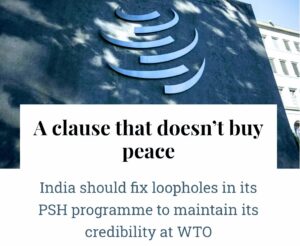 The 13th Ministerial Conference of the World Trade Organisation held in Abu Dhabi in February 2024 ended in a deadlock. However, the Union Minister for Commerce and Industry, Piyush Goyal, who led the Indian delegation, was “completely satisfied.”
The 13th Ministerial Conference of the World Trade Organisation held in Abu Dhabi in February 2024 ended in a deadlock. However, the Union Minister for Commerce and Industry, Piyush Goyal, who led the Indian delegation, was “completely satisfied.”
On the contentious issue of finding a permanent solution to India’s public stock-holding (PSH) programme for food security, he was alluding to the so-called ‘peace clause’ sanctioned at the 9th MC held in Bali (2013), and that arrangement stays.
Does it help?
Under the PSH programme, government agencies, such as the Food Corporation of India (FCI), buy agricultural produce such as wheat, rice/paddy, and coarse cereals from farmers at the minimum support price (MSP) and give it free to India’s poor under the National Food Security Act (NFSA).
The cost of supplying food, i.e., MSP plus handling, storage, and distribution costs, is paid as a subsidy from the Union Budget. This can be bifurcated into two components: first, subsidy to the farmer, which is the excess of MSP of the produce over its international price, also known as the External Reference Price (ERP), and second, subsidy to the food consumer, which is the excess of ERP over ‘nil’. The WTO is concerned with the first one, which is branded “product-specific” subsidies.
The international price/ERP of any commodity is based on global demand-supply forces and is determined competitively. All farmers, irrespective of their country of location, are expected to receive this price. If, because of intervention by the government of a member country, India, for example, the farmers therein receive a price or MSP higher than this, they are presumed to have been subsidised to the extent of excess MSP over ERP.
The WTO is also concerned with subsidies on agricultural inputs such as fertilisers, seeds, irrigation, and power, referred to as “non-product-specific” subsidies. Termed ‘Amber box’ subsidies, under the Agreement on Agriculture (AoA), the total of product and non-product-specific subsidies or aggregate measurement support (AMS) is capped at 10% of the value of agricultural production for a developing country. If a member country gives AMS over 10 per cent, it is a violation.
In India, during the last five years, AMS has exceeded the 10 per cent cap. For instance, during 2019–20, in the case of rice, it was 13.7 per cent.
Meanwhile, responding to representations by developing countries, the MC-9 in Bali (2013) sanctioned a “peace clause.” The clause (as modified in the General Council (GC) of the WTO, 2014) said, “If a developing country gives AMS over 10 per cent, no member will challenge till a permanent solution is found.” India has been escaping being challenged by members citing the “peace clause.” However, this may not last forever as the clause comes with several riders, and India will be hard pressed to prove its compliance with the WTO norms.
First, India has to submit data on food procurement, stockholding, distribution, and subsidies. This puts our food security system under surveillance by the WTO.
Second, India needs to establish that subsidies given to farmers are not “trade distorting.” This requires that cereals procured under the PSH programme are not exported, which is difficult to ensure.
The PSH programme is open-ended, under which the government’s agencies buy the highest possible quantities of wheat and rice from the farmers at an increasing MSP. Since these purchases are unrelated to the requirement under the NFSA, surplus stocks with agencies are inevitable, which they dispose of by auctioning to private traders under the Open Market Sale Scheme (OMSS). Under OMSS, all the bidders are mandated to give an undertaking that they won’t export it.
However, this won’t satisfy the developed countries. Their stance was reflected in an observation by the Thailand Ambassador to the WTO, Pimchanok Vonkorpon Pitfield (who observed that 40 per cent of India’s rice exports were stocks diverted from PSH) during deliberations at the Ministerial in Abu Dhabi. There are also instances of subsidised food (now free) being smuggled to neighbouring countries. While it will not go on record, it gives credence to the idea that India’s PSH programme distorts international trade.
Third, the ‘peace clause’ doesn’t cover programmes implemented after 2013, which means schemes such as PM-KISAN can attract objections. Launched on December 1, 2018, under PM-KISAN, the Union government provides annual income support of Rs 6,000 to farmers to help them buy agricultural inputs.
Considering the challenges mentioned above, it will not be easy for India to buy peace with the ‘peace clause’. India should make efforts to find a ‘permanent solution’ to its PSH dilemma in a fast-track mode. While seeking blanket exemption for subsidies under the PSH programme may not be possible, it should insist on removing flaws in the formula for the computation of the AMS. This will require using the current ERP instead of the 1986–88 price and excluding subsidies given to resource-poor farmers.
(The writer is a policy analyst)
https://www.deccanherald.com/opinion/a-clause-that-doesn-t-buy-peace-2979620